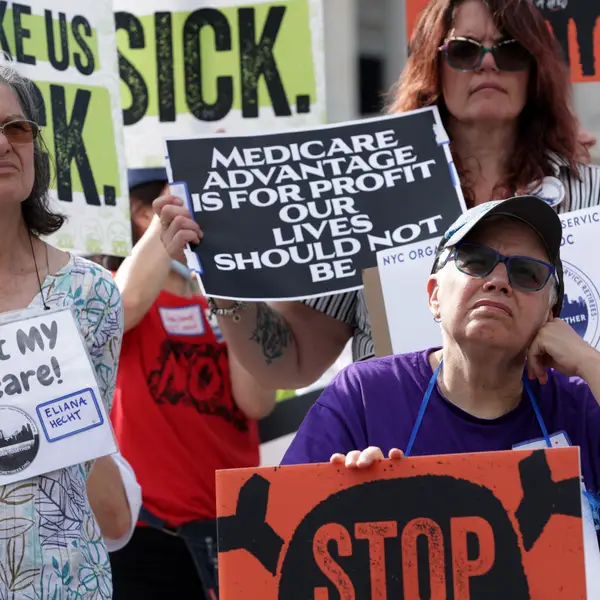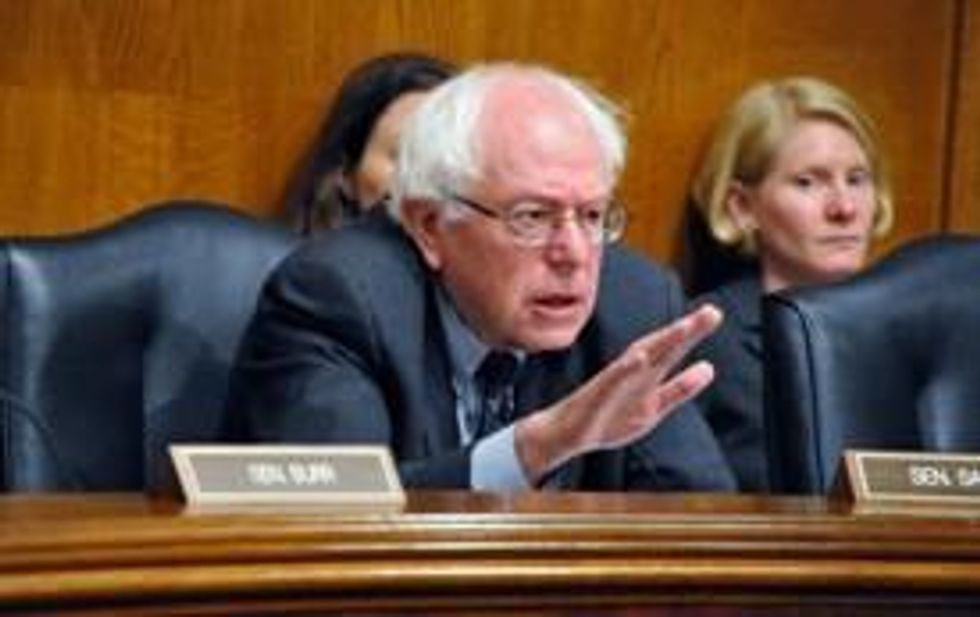Honoring our grandparents, our elders--in these divisive times, at least we hold this value in common, right?
As children, we dutifully sat through long visits or lectures from older relatives, teachers, neighbors or family friends; and then wised up to learn that some of these relationships would prove to be our most enduring.
It's enough to make you think that maybe--just maybe--this shared experience would lead to a steadfast commitment from policymakers to ensure that those who cared for us, fought for us, and raised us, are able to meet their basic needs.
But if you attended Senator Bernie Sanders's hearing on reducing senior poverty and hunger through the Older Americans Act (OAA) on Wednesday, you were in for a rude awakening.
Signed into law by President Lyndon Johnson in 1965 at the same time as Medicare and Medicaid, the OAA provides federal funding for essential senior services like job training, caregiver support, transportation, preventative healthcare, meals and protection from abuse and financial exploitation. Funding for the legislation has failed to keep pace with inflation and population growth for decades. Under sequestration, an additional $40 million will be cut from senior meal programs alone, which means that as many as 19 million fewer meals will be available to seniors who need them.
Sanders, chairman of the Senate Subcommittee on Primary Health and Aging, noted in his opening remarks that OAA "programs not only work to ease isolation, hunger and suffering, they also save taxpayers substantial sums of money."
"It doesn't take a genius to figure it out," said Sanders, with characteristic bluntness. "If you're malnourished, you're going to get sick more often. You may end up in the emergency room at great expense to Medicaid...If you're weak and you fall and break your hip, you end up in the hospital, at an expense of tens and tens of thousands of dollars...We can feed a senior for an entire year for the cost of one day in a hospital."
It emerged as the central theme of the hearing--that shortchanging OAA programs isn't simply a failure on moral grounds, it's bad economic policy.
Ellie Hollander is president and CEO of the Meals On Wheels Association of America, a nonprofit organization representing local senior nutrition programs in all fifty states. She noted a recent study by the Center for Effective Government, which found that for every $1 in federal spending on Meals on Wheels, there is as much as a $50 return in Medicaid savings alone.
"There is an unrecognized but substantial return on investment," said Hollander. "[OAA] programs enable seniors to continue living at home, averting far more costly healthcare alternatives such as hospitals and nursing homes. This reduces Medicare and Medicaid expenses, potentially saving billions of dollars."
But these meals--delivered directly to an individual's home or to groups at places such as senior centers--currently reach only 2.5 million of the 8.3 million elderly who struggle with hunger.
"The resources fall substantially short," said Hollander, noting that demand is increasing and that the senior population will double to more than 70 million people by 2030. She said that real funding levels (adjusted for inflation) for OAA nutrition programs have decreased 18 percent since 1992, while the population of those age 60 and older has increased 34 percent over that same period.
Howard Bedlin, vice president of public policy at the National Council of Aging--a nonprofit service and advocacy organization focusing on economically disadvantaged seniors--testified that there are now more than 23 million economically insecure Americans over 60. They struggle with rising energy and healthcare bills, diminished savings and job loss. The recession caused median wealth for people between ages 55 and 74 to decline by approximately 15 percent, and for those over 65--many of whom now need to continue working or go back to work just to stay afloat--unemployment is at its highest rate since the Great Depression.
The OAA's Senior Community Service Employment Program is "the nation's only workforce program designed exclusively [for] vulnerable seniors," said Bedlin. Nearly 90 percent of participants live in poverty (on less than $11,000 annually), and one-third of them are homeless or at risk of homelessness. While these seniors receive job training that in some cases prevents homelessness, they also perform millions of hours of community service for local organizations struggling with their own budget cuts--"with a value to states and communities estimated at over $1 billion." Due to a lack of resources, the number of seniors served by the program has declined by 34 percent since FY 2010, and the program now has waiting lists in many cities.
Bedlin also addressed the fact that nursing home costs are now $84,000 annually so "it doesn't take long to essentially go bankrupt" due to long-term care. But the OAA's Home and Community-Based Supportive Services help people avoid this situation and remain in their homes, by providing for needs such as transportation, case management, adult daycare and chore assistance.
Bedlin also singled out OAA's cost-saving role in funding evidence-based "fall prevention programs." One in three seniors falls every year, and falls are the leading cause of fatal and nonfatal injuries for people ages 65 and older. The resulting injuries are projected to cost the nation $60 billion in 2020. Research has shown that several local, OAA-supported programs have reduced falls by 30 to 55 percent--which saves money and lives.
Senator Elizabeth Warren pointed to the Pension Counseling and Information Program--which helps seniors recover lost pensions--as one that could be reaching many more seniors with a modest investment. As companies merge, move or change names, people are sometimes unable to obtain the benefits that they worked for, and can't afford legal assistance to help them recover what they've earned. This OAA program funds six regional counseling projects that help individuals in 29 states.
Nancy Altman, co-director of Social Security Works, testified that the counseling program has recovered more than $175 million in pension benefits for 50,000 clients since 1993--a return of $8 dollars for every federal dollar spent on the program. The current federal cost is $1.6 million, and those monies are used to leverage private and foundation resources, as they are with all OAA programs.
Altman said that some of the states not covered by the six regional projects have a high senior population, such as Florida. If all fifty states were served, Altman believes pension benefits recovered for seniors would likely double.
For Warren, the need to support OAA programs is clear.
"What is our measurement of who we are as a people other than how we treat those who are more vulnerable?" she said. "This is a place where good economics merges with the decisions that are right for us as a country."
Sanders and seventeen cosponsors have introduced a bill to reauthorize the OAA with a funding increase of 12 percent over FY2010 levels, the amount required to begin to catch up with population growth and inflation over the past decade. (The funding that year was approximately $2.3 billion, accounting for just 0.06 percent of the federal budget; with the proposed increase it would be about 0.07 percent.) He said that "level funding just continues the downward spiral."
"I happen to believe that if 100 million people were watching this panel today, there would be overwhelming support for this program and significantly increasing funding," said Sanders. "So I urge and ask people all over this country to stand up for seniors right now, stand up for cost-effective government."




